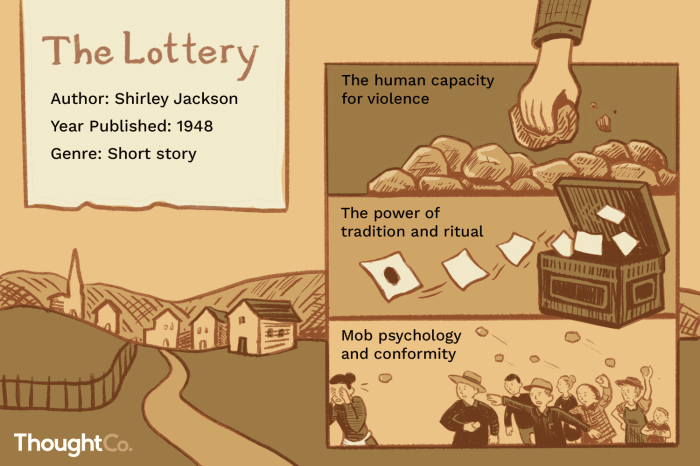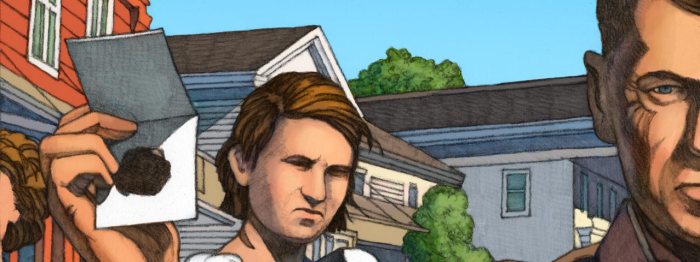The lottery shirley jackson questions – Embarking on an exploration of “The Lottery” by Shirley Jackson, this discussion delves into the profound questions raised by the story, examining its themes, characters, symbolism, setting, style, and cultural significance. Through a meticulous analysis, we unravel the intricate tapestry of the narrative, shedding light on its enduring relevance and impact.
Within the enigmatic world of “The Lottery,” we encounter a myriad of thought-provoking elements that invite contemplation and interpretation. The story’s exploration of tradition, conformity, and the insidious nature of violence has captivated readers for generations, prompting a multitude of inquiries.
The Lottery: Themes: The Lottery Shirley Jackson Questions
Shirley Jackson’s “The Lottery” explores several significant themes, including the dangers of blind tradition, the power of conformity, and the fragility of human civilization.
The lottery is a tradition that has been passed down for generations, and no one can remember why it was started. The villagers participate in the lottery out of habit and fear, even though they know that someone will be stoned to death.
The lottery represents the dangers of blind tradition. When people blindly follow tradition, they can lose sight of the reasons behind it and the harm it can cause. The lottery is a cruel and senseless ritual that has no place in a civilized society.
The Power of Conformity
The lottery also demonstrates the power of conformity. The villagers participate in the lottery because they are afraid of being ostracized if they don’t. They know that the lottery is wrong, but they are too afraid to speak out against it.
The power of conformity can be a dangerous thing. It can lead people to do things that they know are wrong, simply because everyone else is doing them.
The Fragility of Human Civilization
The lottery also highlights the fragility of human civilization. The villagers in “The Lottery” are a simple people, but they are capable of great cruelty. The lottery shows that even the most civilized societies are capable of descending into barbarism.
The lottery is a warning to us all. It reminds us that we must never take our civilization for granted. We must always be vigilant against the forces that can destroy it.
The Lottery: Characters

The characters in “The Lottery” are simple people, but they are complex and well-developed.
Tessie Hutchinson
Tessie Hutchinson is the protagonist of the story. She is a young woman who is married to Bill Hutchinson and has three children. Tessie is a kind and loving mother, but she is also a victim of the lottery.
Tessie is a complex character. She is both a victim of the lottery and a participant in it. She knows that the lottery is wrong, but she is too afraid to speak out against it.
Bill Hutchinson
Bill Hutchinson is Tessie’s husband. He is a farmer who is respected by the villagers. Bill is a kind and loving husband, but he is also a product of his environment.
Bill knows that the lottery is wrong, but he does not have the courage to stand up against it. He is afraid of being ostracized by the villagers.
Mr. Summers
Mr. Summers is the town clerk. He is a well-respected man who is responsible for organizing the lottery.
Mr. Summers is a complex character. He knows that the lottery is wrong, but he does not have the courage to stop it. He is afraid of the villagers’ reaction.
The Lottery: Symbolism
Shirley Jackson uses several symbols in “The Lottery” to create a sense of foreboding and to foreshadow the story’s tragic ending.
The Black Box, The lottery shirley jackson questions
The black box is the box that contains the slips of paper that are used to select the winner of the lottery. The black box is a symbol of fate and death.
The villagers are afraid of the black box, and they know that it will bring bad luck to whoever is chosen.
The Stones
The stones are used to stone the winner of the lottery to death. The stones are a symbol of violence and brutality.
The villagers are willing to use the stones to kill one of their own, which shows how far they have descended into barbarism.
The Lottery Itself
The lottery itself is a symbol of the dangers of blind tradition and the power of conformity.
The lottery is a cruel and senseless ritual that has no place in a civilized society.
The Lottery: Setting
The setting of “The Lottery” is a small village in rural America. The village is a close-knit community, and the villagers are all familiar with each other.
The village is a symbol of the dangers of isolation and the power of tradition. The villagers are so isolated from the outside world that they have lost sight of the reasons behind their traditions.
The lottery is a symbol of the dangers of blind tradition and the power of conformity. The lottery is a cruel and senseless ritual that has no place in a civilized society.
The Significance of the Lottery in Relation to the Setting
The lottery is a central part of the village’s life. It is a tradition that has been passed down for generations, and it is something that the villagers take very seriously.
The lottery is a symbol of the village’s isolation and its lack of progress. The villagers are so focused on the lottery that they have forgotten about the outside world.
The Lottery: Style
Shirley Jackson uses a variety of literary devices in “The Lottery” to create a sense of foreboding and to foreshadow the story’s tragic ending.
Foreshadowing
Jackson uses foreshadowing throughout the story to hint at the lottery’s tragic ending. For example, the story begins with a description of the black box, which is a symbol of death.
Jackson also uses foreshadowing in the dialogue of the characters. For example, Mr. Summers says, “Of course,” when Tessie asks him if there is any way to avoid the lottery.
Irony
Jackson also uses irony in “The Lottery.” For example, the lottery is supposed to be a way to bring the villagers together, but it actually divides them.
Jackson also uses irony in the ending of the story. The villagers are so focused on the lottery that they do not realize that they are destroying themselves.
Symbolism
Jackson uses symbolism throughout the story to create a sense of foreboding and to foreshadow the story’s tragic ending. For example, the black box is a symbol of death, and the stones are a symbol of violence.
The Lottery: Cultural Significance

“The Lottery” was first published in 1948, and it has since become one of the most widely read and studied short stories in American literature.
The story has been interpreted in many different ways, but it is generally seen as a critique of the dangers of blind tradition and the power of conformity.
The Story’s Relevance to Contemporary Society
“The Lottery” is still relevant to contemporary society today. The story reminds us that we must never take our civilization for granted. We must always be vigilant against the forces that can destroy it.
The story also reminds us of the importance of individuality and free thought. We must never be afraid to question tradition and to stand up for what we believe in.
Frequently Asked Questions
What is the main theme of “The Lottery”?
The story explores the dangers of blindly adhering to tradition and the insidious nature of mob mentality.
Who are the main characters in “The Lottery”?
The story centers around the villagers, particularly Tessie Hutchinson, who is ultimately chosen as the sacrificial victim.
What is the significance of the black box in “The Lottery”?
The black box symbolizes the arbitrary and unjust nature of the lottery, as well as the villagers’ unquestioning acceptance of their fate.